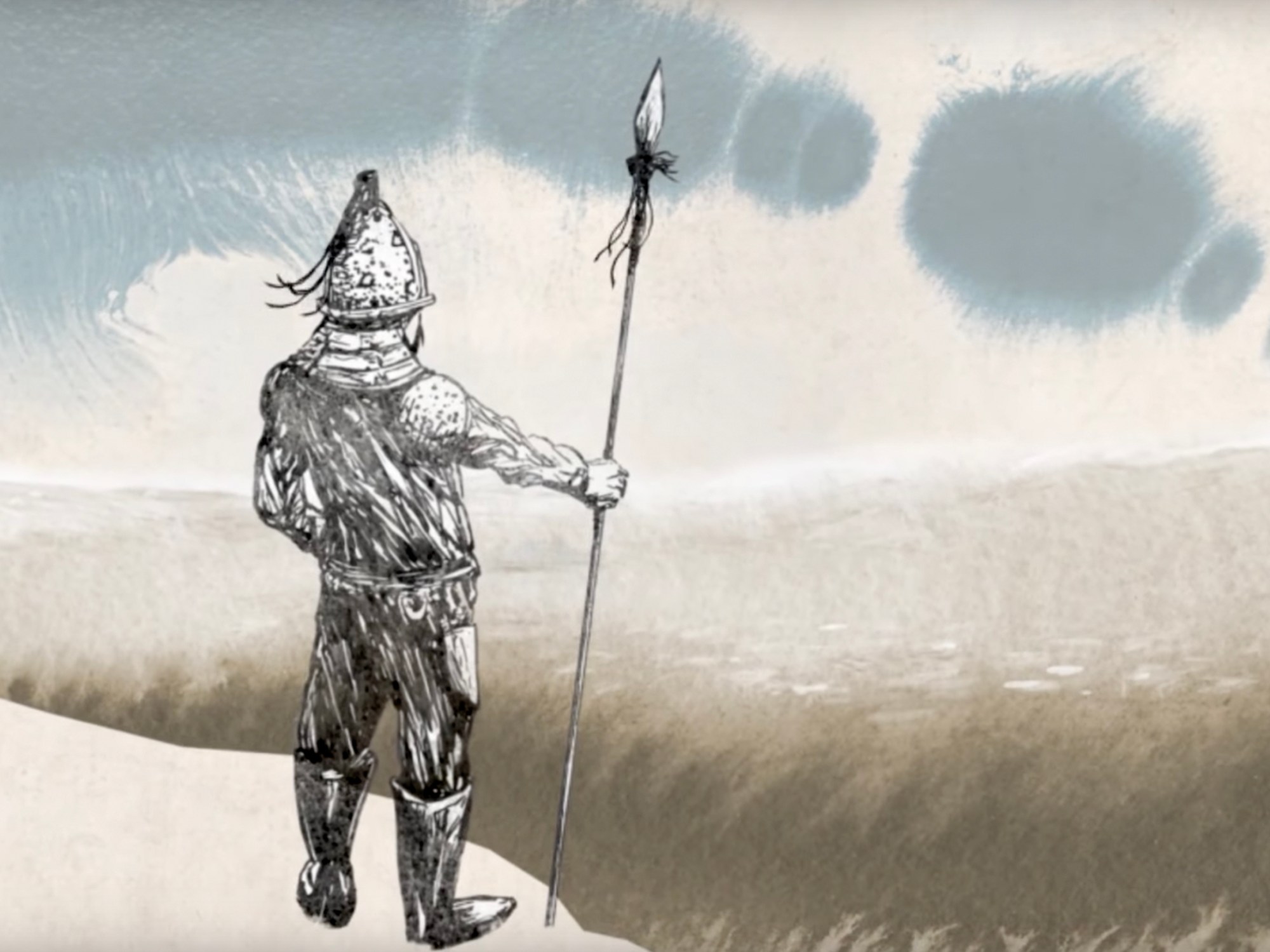
- Industry
Docs: “Echoes of the Empire” Explores Mongolia, From Genghis Khan to Today
With territory stretching from the Sea of Japan to the edge of present-day Poland, and from the Arctic in the north to India in the south, the Mongol Empire of the 13th and 14th centuries represents the largest contiguous land kingdom in history. Directed by Robert H. Lieberman, the fascinating if scattershot documentary Echoes of the Empire: Beyond Genghis Khan offers up a surface-skimming overview, like a stone skipped across water, of the man who consolidated all this power, and the long, long shadows of his conquest all the way into present day Mongolia.
Born Temüjin around 1162, Genghis Khan (also known as Chinggis Khaan to the Mongolian people) survived a harsh childhood, and steadily unified various nomadic Mongol tribes through both bloody battles and coercion. By 1206, he was the unquestioned leader of an unprecedented unitary military and political force — the sprawling result of which recent genetic testing indicates could be responsible for as many as 20 million direct descendants. Even after his death in 1227, the empire of Genghis Khan continued to grow, via his offspring, for two more generations.
Echoes of the Empire alights upon its subject’s battlefield intelligence (diverting rivers to topple walls, for instance), but it at all isn’t war-obsessed. Instead, the movie spends most of its historical allotment sketching out Genghis Khan’s not inconsiderable political accomplishments, which include a writ of religious freedom, the establishment of global commerce, and the first recorded international law, in the form of decreed protection for all ambassadors and emissaries. The film at least acknowledges, even if it doesn’t aim to fully unpack them, the contradictions inherent in these civilized measures (as well as banning the kidnapping of women) when placed side-by-side with decades of rampaging and brutal killing.
As Lieberman blends the past into the present, he stocks his movie with an admirably wide variety of interview subjects spanning all manner of disciplines and perspectives. Mongolian poet Gombojav Mend-Ooyo provides an invaluable frame of reference on nomadic life, reflecting on the cultural practice of learning to racehorses as a four-year-old. Dashdoorov Gereltuv, the director of travel tour company Mongolia Quest, lends credence to the idea of his country as perhaps the world’s most incredibly diverse national park, with one-third of its mass consisting of the Gobi Desert and its easternmost regions representing one of last untouched steppe ecosystems on the planet.
Oyungerel Tsedevdamba, an author, activist and former member of Mongolia’s Parliament, provides trenchant analysis of problems related to modernization. Later, artists like Orkhontuul Banzragch and Dorjsuren Lkhagvadorj, whose arresting work addresses social fissures and other issues, talk in an equally interesting and complementary way about trying to meld elements reflective of Mongolia’s nomadic lifestyle with minimalism and anti-consumerism, all in a way that connects with modern audiences.
Other interviewees, including journalist and filmmaker Peter Bittner and former United States Ambassador to Mongolia Jonathan Addleton, provide a decidedly macro, bird’s-eye view of the country and its history. Chief amongst this group is American-born professor of anthropology and author Jack Weatherford, to whom much time is ceded. This isn’t necessarily a bad thing (he’s an extremely knowledgeable source), but there are times when his erudite historical narration (waxing rhapsodic about Genghis holding his young bride in the moonlight, for example) feels less the product of inventive creative license and more simply ridiculous and invented.
Echoes of the Empire most hits its stride when shining a light of social explication on what is for many viewers a faraway land, oft mentioned but little understood. While roughly 30 percent of Mongolians still live pastoral lives, around half of the country’s total population of 3.3 million lives in the capital of Ulaanbaatar. While very modern in most areas, it is also surrounded by and indeed mixed with yurts (also known as gers), moveable Mongolian domiciles whose residents have no power or plumbing and instead rely on coal. This contributes to a tremendous socioeconomic divide, as well as incredible seasonal pollution.
Director-cinematographer Lieberman — whose other collaborations with producer Deborah Hoard include 2012’s clandestinely filmed They Call It Myanmar, about imprisoned democratic activist Aung San Suu Kyi and probably the second-most self-isolated country in the world — exhibits a boundless intellectual curiosity that will please viewers who embrace the maxim that the best life is one in which one never stops learning. Unfortunately, there isn’t the strongest sense of cohesive authorial vision or even editorial flow, as Lieberman and editor-cameraman David Kossack fail to establish graspable points of pivot.
A sort of cinematic dragonfly, the briskly paced Echoes of the Empire flits from one topic (Mongolian bankhar dogs, a peaceful transition to democracy in 1989) to the next (a formal education gap which skews heavily in favor of women, a tradition of “long song” born of elongated vowels). At least the movie, with aerial cinematography credited to Michael Roberts and some nice brushstroke animation which mimics the flowing nature of its traditional written language, remains visually stimulating throughout. In telling both the story of Genghis Khan and present-day Mongolia, Lieberman’s film serves as a reminder that, whether we like it or even choose to acknowledge it, we are all products of and in some ways beholden to cultural practices and historical realities stretching back centuries before our birth.

